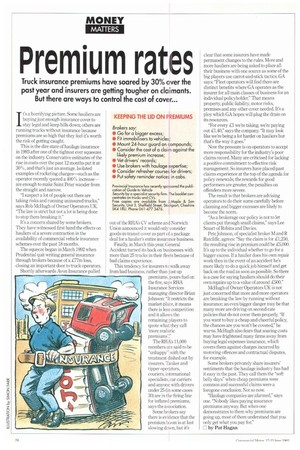Premium rates
Page 26

If you've noticed an error in this article please click here to report it so we can fix it.
Truck insurance premiums have soared by 30% over the past year and insurers are getting tougher on claimants. But there are ways to control the cost of cover...
/t's a horrifying picture. Some hauliers are buying just enough insurance cover to stay legal and keep bills down; others are running trucks without insurance because premiums are so high that they feel it's worth the risk of getting caught.
This is the dire state of haulage insurance in 1993 after one of the tightest ever squeezes on the industry. Conservative estimates of the rise in costs over the past 12 months put it at 30 l'.6, and that's just an average. Isolated examples of rocketing charges—such as the operator recently quoted a 400% increase— are enough to make Saint Peter wander from the straight and narrow.
"I suspect a lot of people out there are taking risks and running uninsured trucks," says Rob McHugh of Owner Operators UK, "The law is strict but not a lot is being done to stop them breaking it."
It's a concern shared by some brokers. They have witnessed first hand the effects on hauliers of a severe contraction in the availability of commercial vehicle insurance schemes over the past 18 months.
The squeeze began in March 1992 when Prudential quit writing general insurance through brokers because of a £77m loss, closing an important door to truck operators.
Shortly afterwards Avon Insurance pulled out of the RI-LA's CV scheme and Norwich Union announced it would only consider goods-in-transit cover as part of a package deal for a haulier's entire insurance business.
Finally, in March this year, General Accident turned its back on businesses with more than 25 trucks in their fleets because of bad claims experience.
This tendency for insurers to walk away from bad business, rather than just up premiums, pours fuel on the fire„says RHA Insurance Services managing director Brian Johnson: "It restricts the market-place, it means there is less competition and it allows the remaining players to quote what they call more realistic premiums'."
The RHA's 11,000 members are said to be "unhappy" with the treatment dished out by insurers. Tanker and tipper operators, couriers, international specialists, car carriers and anyone with drivers under 25 (in some cases 30) are in the firing line for inflated premiums, says the association.
Some brokers say there is evidence that the premium boom is at last slowing down, but it's clear that some insurers have made permanent changes to the rules. More and more hauliers are being asked to place all their business with one source as some of the big players use carrot-and-stick tactics. GA says: "Fleet operators will find there are distinct benefits where GA operates as the insurer for all main classes of business for an individual policyholder." That means property, public liability, motor risks, premises and any other cover needed, It's a ploy which GA hopes will plug the drain on its resources.
"For every we're taking, we're paying out £1.40," says the company. "It may look like we're being a lot harder on hauliers but that's the way it goes."
Now the pressure is on operators to accept more responsibility for the industry's poor claims record. Many are criticised for lacking a positive commitment to effective risk management So insurers have placed past claims experience at the top of the agenda for policy renewals; the rewards for good performers are greater, the penalties on offenders more severe.
The result is that brokers are advising operators to do their sums carefully before claiming and bigger excesses are likely to become the norm.
"As a brokerage our policy is not to let clients put through small claims," says Lee Smart of Robins and Davies.
Pete Johnson, of specialist broker M and R Ratcliffe, agrees: "Say the claim is for £1,250, the resulting rise in premium could be ,£5,000. It's up to the individual whether to go for a bigger excess, If a haulier does his own repair work then in the event of an accident he's more likely to do a quick job himself and get back on the road as soon as possible. So there is a case for saying hauliers should do their own repairs up to a value of around L500."
McHugh of Owner Operators UK is not just concerned that more and more operators are breaking the law by running without insurance; an even bigger danger may be that many more are driving on second-rate policies that do not cover them properly. "If you want to buy a cheap and cheerful policy, the chances are you won't be covered," he warns. McHugh also fears that soaring costs may have frightened many firms away from buying legal expenses insurance, which covers them against charges incurred by motoring offences and contractual disputes, for example.
Some brokers privately share insurers' sentiments that the haulage industry has had it easy in the past. They call them the "soft belly days" when cheap premiums were common and successful claims were a foregone conclusion. Not so now.
"Haulage companies are alarmed," says one. "Nobody likes paying insurance premiums anyway. But when one demonstrates to them why premiums are going up, most of them understand that you only get what you pay for."
by Pat Hagan
















































































